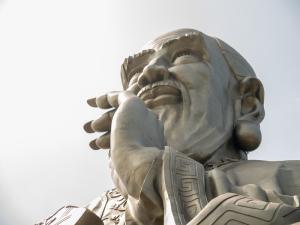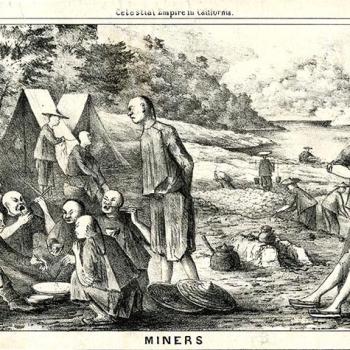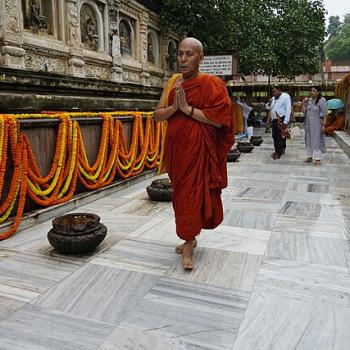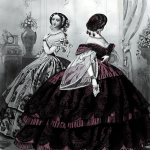Fake quotes are a known hazard of the Web. The Chinese philosopher Laozi (or Lao tzu) currently may be the most commonly attributed source of fake quotes on social media. I can’t verify that, but there’s no question the Web is well stocked with memes pairing him with lovely sayings he never said. It may take Laozi a while to catch up to the all-time king of fake quotes, Confucius, but give him time.
Who Was Laozi?
Laozi is remembered as the author of the Daode jing (or Tao te ching; “the way and its virtue”), one of the classics of Chinese philosophy. The Daode jing is the only work attributed to Laozi. And since the Daode jing is not very long — just 81 verses, in most editions — spotting a fake Laozi quote is simple. And if it’s not in the Daode jing, Laozi didn’t say it.

There are those who argue, “Well, MAYBE he said it SOMETIME and just didn’t write it down.” Seriously. But there’s a complicating factor. The Laozi who authored the Daode jing probably didn’t exist as a flesh and blood person. He appears to be a fictional creation.
The standard biography of Laozi was recorded by the scribe and historian Sima Qian (ca. 145–86 BCE). In this story, Laozi was an archivist at the imperial court and a contemporary of Confucius (551–479 BCE), who consulted him from time to time. Laozi served the ancient Zhou Dynasty, which ended in 221 BCE. At some point Laozi decided to leave Zhou and so encountered Yin Xi, a legendary figure in charge of the western gate of the Zhou capital. Yin Xi recognized Laozi and asked him to not leave without writing down his teachings
So, Laozi promptly sat down, wrote the 81 or so verses, and went on his way. No one ever heard from him again. And historians say there is no corroboration for any of this story.
Who Wrote the Daode jing?
Might there have been a real Laozi? Perhaps, but another complicating factor is that the Daode jing had more than one author. Analysis of the text point to at least two authors with distinctive styles. Some verses might date to the time of Confucius, but some of them clearly don’t, scholars have decided. It appears the verses were collected and compiled over many years.
Laozi means “old master.” Maybe some long-ago copyist of the verses felt a need to attribute them to somebody, and figured they must have come from some old master. And a legend was born.
Religious and Philosopical Daoism
Laozi is also said to be one of the founders of Daoism (or Taoism). “Daoism” is an English construction that can refer to both a philosophy (daojia) and a religion (daojiao). Philosophical Daoism and religious Daoism overlap but are not the same thing. I dare say philosophical Daoism is more popular in the West, while religious Daoism is more common in Asia. In religious Daoism, Laozi became a deity called Lao Jun, or Lord Lao, revealer of sacred texts and source of salvation.
But even philosophical Daoism has its mystical elements, especially the Dao (“the way”) itself. The name suggests a spiritual path, but it is also described in the Daode jing as the beginning of heaven and earth. It is the order of the cosmos and the primordial source of all things.
Silent and void
It stands alone and does not change,
Goes round and does not weary.
It is capable of being the mother of the world. [verse 35, D.C. Lau translation]
Western Chauvinism and Fake Asian Quotes
Getting back to the fake quote memes — it seems to be a common pasttime to think up some new-agey slogan and then attribute it to a famous Asian philosophical or spiritual figure in a meme. If it’s not Laozi, it’s Confucious, or the Buddha. There may be memes with fake quotes attributed to Plato or Nietzsche or even Jesus, but I can’t say I’ve ever seen one.
Asians are considered fair game, for some reason. Maybe the meme-makers figure they can get away with attributing things to Asians, in the assumption that Asian texts are less well known. And, of course, this smacks of western chauvinism, which holds Socrates in awe but says it’s okay to make fun of Confucius.
But in the case of the Daode jing, lots of westerners have read it and love it. It’s truly a timeless little book, with observations about humanity and society and government and the Great Ineffable Whatever at the center of all things that still ring true. And it’s only 81 verses long. Lots of English speaking people know very well what’s in it, better than they know whatever it was that Aristotle wrote.
Since he probably didn’t exist, it’s fair to assume that Laozi never said anything. Even so, it’s still conventional to attribute quotes from the Daode jing to Laozi, whether he wrote it or not. But anything not in the Daode jing but attributed to Laozi is, obviously, a fake quote. So no, he didn’t say “Care about what other people think, and you will always be their prisoner.” Or, “Be careful what you water your dreams with.” Or most of what he’s said to have said.
Fake Laozi quotes are so common one fellow has collected a book of them, which I have not seen, but I appreciate the effort.
The Real Daode Jing
The Daode jing is said to be the second most translated book ever written, after the Bible. At least 40 editions have been published just in English, probably a lot more. Some of these, such as the popular Stephen Mitchell version, are not translations but interpretations of the text based on other people’s translations. Of those translations I am familiar with, I recommend either D.C. Lau’s or John C. H. Wu’s.
(A quick note on spelling — there are two spelling systems used for rendering Chinese into English. The older one is the Wade-Giles system, invented by a couple of 19th century British scholars. Lao tzu and Tao te ching are Wade-Giles spellings. More recently the pinyin spelling system was created in China, and pinyin has since been adopted as the international standard by the United Nations and other organizations. Laozi and Daode jing are pinyin spellings. Wade-Giles is expected to disappear within a few years.)













